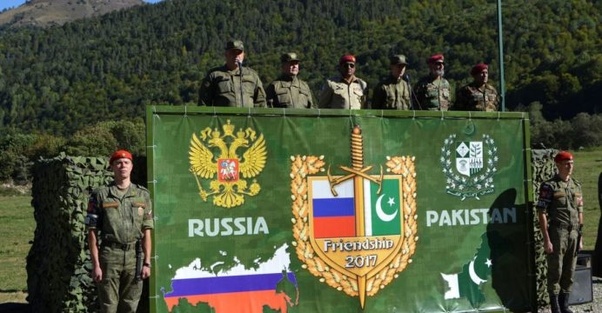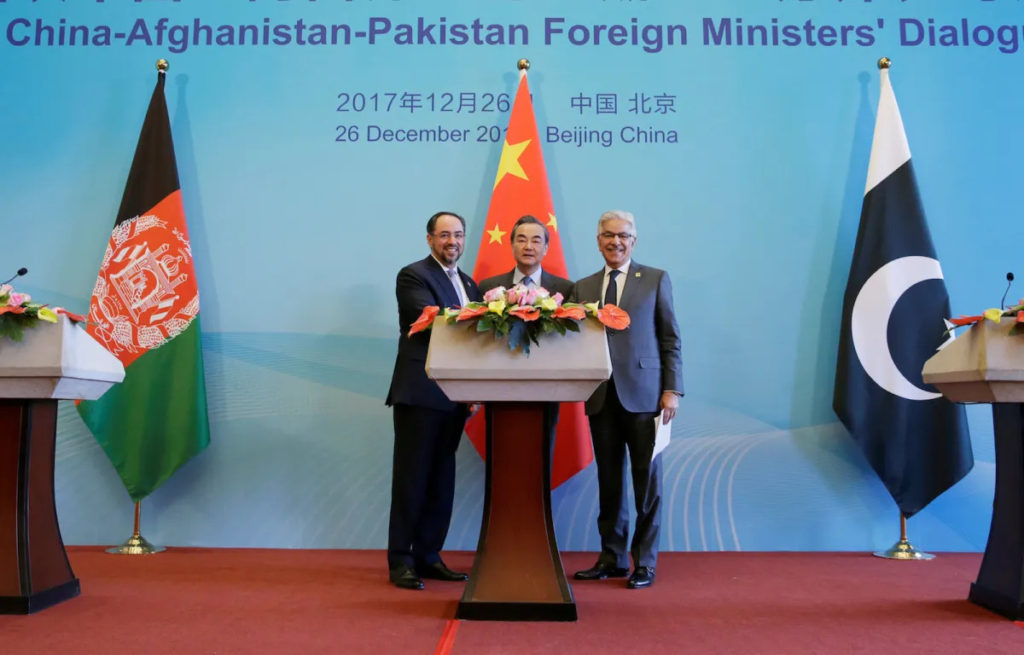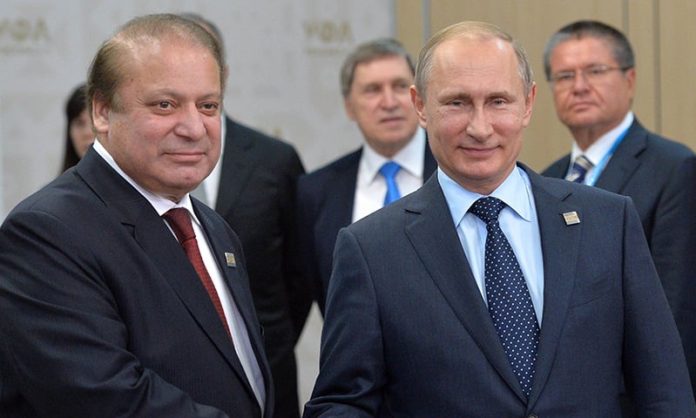The national interest of a country often plays the underlying role in determining its relations with other states. Similarly, due to convergent and shared economic and security objectives, both Pakistan and Russia are slowly but steadily coming closer to each other on economic and security fronts. After Pakistan’s inclusion into the Shanghai Cooperation Organization (SCO) as a full member, Russia has repeatedly demonstrated its willingness to work with Pakistan so as to eliminate the unfolding terror of Daesh in the region, clamp down on the mushrooming regional drug trade and bring about lasting serenity and stability in war-stricken Afghanistan.
On account of the ongoing climate of trust and convergence of security objectives, both countries successfully conducted special operation drills in Pakistan from September 24 to October 10 last year. More importantly, after the dismal failure of the Quadrilateral Coordination Group (QCG) to bring peace and stability in Afghanistan, Russia, China and Pakistan have recently conducted a round of discussions in Moscow about Afghan peace and the needed coordination to prevent the spillover effects of Daesh on Pak-Afghan region and the backyard of Russia.
After recovering from the obstructive economic and security impacts of the Cold War, Russia has lately begun expanding its military tentacles in the Middle East and Eastern Europe. In this regard, Russian incursion of strategically important Crimea and its military assistance to the tottering Assad regime in Syria are two major cases in point. On the other side, Pakistan is projected to become the regional trade hub due to the Gwadar Port and the construction of multi-billion China-Pakistan Economic Corridor (CPEC).
Prospects of Pak-Russia Economic Relations
After India’s strategic tilt to America and the European Union’s (EU) sanctions on Russia, the Russian government has been engaged in searching new markets for its exports of defence production and energy resources and imports of edible items. Interestingly, due to American repeated ‘do more mantra’ and discriminatory nuclear support to India, Pakistan is also immersed in finding out new markets for its defence imports. So, this is the opportune time for both countries to increase bilateral trade to reap rich economic dividends.
Pakistan and Russia signed a much-needed energy deal of $1.7 billion on December 23, 2014 for laying a liquefied natural gas (LNG) pipeline from Karachi to Lahore. After the EU’s crushing sanctions on Russian energy market, Moscow has been inclined to conclude more energy accords with Islamabad. Pakistan can seek out Russian financial assistance and the expertise of Russia’s oil and gas companies such as Rosneft and Gazprom to construct its portion of the 785 km of the Iran-Pakistan (IP) gas pipeline. Moreover, Russia has offered Pakistan investment in the energy sector, and the export of 5000 MW electricity through Kyrgyzstan-Afghanistan route. Moscow, too, has recurrently offered its cooperation in transnational energy projects such as CASA-1000 and the Turkmenistan-Afghanistan-Pakistan-India (TAPI) gas pipeline.
In the wake of EU’s sanctions on Russian energy exports, Russia has imposed bans on agriculture and textile products from European countries. Therefore, this has created an increasing scarcity of food items and needed textile goods in Russia. Pakistan can avail of this marvellous opportunity by exporting agricultural and textile products to Russia at competitive prices. Due to a shorter distance, Pakistani farmers would gain maximum profits by trading with Russian dealers. This will also help Pakistan import modern agriculture technology and machinery from Russia and afford it to local farmers so that they can increase the productivity of their farms.
Being a developing country, Pakistan is faced with multiple problems in terms of commencing industrialisation throughout the country. Due to mismanagement, corruption and nepotism, the only mega industrial unit in the country, the Pakistan Steel Mills (PSM), has been a white elephant and running in losses. To revive and increase the declining capacity of PSM, Russia’s Magnitogorsk Iron and Steel Factory (MMK) has shown interest in helping to expand the capabilities of PSM from one million to three million tonnes of production a year. Apart from this, Pakistan can also invite other Russian companies to assist small and medium size local industries in establishing industrial zones in the country.
What is interesting to note is that Russia is a significant part of China’s One Belt One Road (OBOR) initiative. The OBOR is a combination of two routes, the New Silk Road Economic Belt will run westward overland through Central Asia and onward to Europe. The second route, the 21st Century Maritime Silk Road (MSR), will run south and westward through the sea to Europe with stops in South East Asia, South Asia and Africa. CPEC is just one of the tributaries of the OBOR vision and it is the most important one.
It has been hitherto an unaccomplished Russian dream to have uninterrupted access to the warm waters of the Arabian Sea. If Pakistan fulfills this Russian dream through CPEC in future, this will help her to make Gwadar the trade hub of South Asia, Central Asia and the Middle East. Russian presence in the Arabian Sea will be fruitful in stamping out growing regional drug trade. But, after increasing its naval presence in the region, Russia will employ its naval fleet in the Arabia Sea to flex its military muscle in the Middle East and South Asia. Therefore, such a move will probably instigate America to foment insurgency, militancy and sectarian violence in low-insurgency hit Balochistan. So, Pakistan should move with sagacity and caution in providing an access to Russia to the Arabian Sea

Prospects of Pak-Russia Defense Ties
Since Russia’s short war with Georgia in 2008, it has been engaged in augmenting its military spending chiefly calculated to counterbalance NATO’s expansion in Eastern Europe. At present, Russia is the third largest military spender after America and China. Owing to Russian efforts, the Collective Security Treaty Organization (CSTO) has transformed into an intergovernmental military alliance protecting Russian security interests in the energy-rich Central Asia. In a nutshell, Russia’s successful annexation of strategically important Crimea, its timely military intervention to shore up the struggling Assad regime in Syria and rapid modernization of its defence sector have made Russia a great military power once again.
As explained above, Russia is somewhat anxious about the burgeoning exports of American and European military equipment and technology to India. Such Indian arms imports from the West have deprived Russia of substantial revenue which it had earned by exporting defence equipment o India. Therefore, Moscow is poised to strengthen its defence ties with Pakistan aimed at selling its arms to Islamabad as well as jointly working to inhibit Daesh from cultivating terror roots in the region. The recent joint military exercises between the two is indicative of the growing Pak-Russia military cooperation in the region.
On the other side, Pakistan is concerned about the growing American strategic and military partnership with India, which is expected to increase under the Trump administration. In April 2016, the Obama administration myopically declined to grant $ 430 million to Pakistan for the purchase of eight F-16s. What is important to mention is that Indian lobbies played the central role in inducing American Congress to block the grant of the stipulated amount to Pakistan.
Since Pakistan has been engrossed in waging a long and expensive war against assorted terrorist and militant groups and is threatened by neighbouring India, the country needs advanced aircraft and timely modernization of its existing weaponry in order to make its security effective. It is pertinent to note that Russia removed its arms embargo against Pakistan in 2014, more importantly the Kremlin has lately agreed to sell four MI-35 helicopters to Pakistan. In the post arms embargo period, Pakistan can also purchase Sukhoi-35 fighter jets from Russia and seek Russian assistance to modernise its existing fighter aircraft.
Pak-Russia Cooperation against Terrorism
Both Pakistan and Russia are facing the threat of terrorism and militancy. Terrorism is a major problem plaguing Pakistan with losses of nearly $ 117 billion and around 50,000 lives. The emergence of Daesh in Afghanistan currently poses a severe threat to Pakistan’s tribal areas and the peripheries of Russia. In this context, along with China, Pakistan and Russia have recently conducted a series of consultations on how to prevent the possible spillover effects of Daesh. The three countries have demonstrated willingness and seriousness to invite Kabul for next round of talks. Arguably, such an emerging cooperation is likely to prove effectual in eliminating the militancy of Daesh from the region, especially from Afghanistan.
Pakistan shares SCO’s concerns regarding the three evils of terrorism, extremism and separatism. Under the umbrella of the SCO it would acquire comprehensive counter-terrorism and counter-militancy assistance from the Tashkent-based Regional Anti-Terrorist Structure (RATS) to stamp out rampaging terrorism, bubbling militancy and disruptive low-intensity insurgency in restive Balochistan. Moreover, coordinative intelligence sharing and joint operation between Pakistan and Russia will greatly help them clamp down the deadly Islamic Movement of Uzbekistan (IMU) based in Afghanistan.
Pakistan can adopt a two-pronged approach by joining hands with the SCO to combat drug cultivation in Afghanistan and bust drug cartels operating in the region. With China and Russia, Pakistan may conduct vigorous joint naval anti-narcotics drive in the Arabian Sea against the burgeoning drug smuggling.
Russia has played a significant role in foiling all short-sighted Indian moves to label Pakistan as terrorist. At the BRICS summit held India in October 2016, Indian supremacist Prime Minster Narendra Modi called Pakistan the ‘mothership of terrorism’ that should be isolated as such. But, while delivering his speech, Russian President Putin adroitly avoided using the word terrorism which signalled his outright rejection of Modi’s Pakistan-bashing. Moreover, when Modi and Afghan President Ashraf Ghani blamed Pakistan for sponsoring regional terrorism during the Heart of Asia conference in December 2016, the Russian representative sternly rejected the Afghan and Indian accusations of Pakistan and termed these allegations unjustified and unfounded.

Pak-Russia Cooperation for Afghan Peace
After watching the repeated American failures to bring about reconciliation, stability and tranquility in Afghanistan, Russia has recently demonstrated its willingness to play a role in Afghan peace and security. After the tripartite consultations on Afghan conflict, Pakistan, China and Russia have extended an invitation to the unity government of Afghanistan to participate in the next round of discussion so as to bring peace in the war-stricken country.
As now Pakistan is a full member of the SCO, it can persuade China and Russia to come forward with their technological know-how and fiscal resources to help Afghanistan benefit from its natural resources and play a bigger role in Afghan reconciliation. When suitable, Pakistan may bank upon the SCO to resolve the issue of a plethora of Indian diplomatic missions in Afghanistan, reportedly supporting terrorism and insurgency inside Pakistan.
Challenges to Emerging Pak-Russia Relations
Pakistan and Russia could face some hurdles during the course of improving bilateral relations. India may use pressure tactics or strive to strengthen its ties with Russia to the level so that Moscow does not feel the need of an extra market for its arms sale. Since America is highly apprehensive of Russian naval presence in the Persian Gulf and the Arabian Sea, the Trump administration will use backstairs influence and pressure to stop Islamabad from jumping onto the Russian bandwagon. Washington will capitalise on the International Monetary Funds (IMF) and the World Bank (WB) to prevent Pakistan from fostering its security and economic relations with Russia. The Indo-American bloc could expedite its support to Pakistani-based terrorist and insurgent groups so that they could create instability and uncertainty in Pakistan.
The Way Forward
It is not uncommon that whenever two rivals decide to bury the hatchet, they are likely to face some hurdles in their budding relations. Both Pakistan and Russia should not let their historical legacy, divergent objectives and the designs of India and America create obstacles on the way of bilateral relations. The following points may be helpful in this regard:
• Both countries should arrange and facilitate wide-ranging discussions between members of civil, military and economic institutions. Such interactions will build trust, promote transparency and help increase meaningful cooperation on a wide range of issues between the two countries.
• Both countries should take the unity government of Afghanistan into confidence and work with Kabul to inhibit the growth of Daesh in Afghanistan. This will help Pakistan and Russia to play an effectual role in the reconciliation process between the Afghan Taliban and the Afghan government.
• Pakistan should provide incentives to Russia so that Russian companies display readiness in working to improve Pakistan’s energy sector, accelerate its industrialisation process, build infrastructure and improve agricultural productivity.
• Pakistan should establish a long-term strategic partnership with Russia. Russian expertise in the field of nuclear technology will be of paramount importance for Pakistan to increase the capacity of its production of nuclear energy for civilian use.
• Lastly, Pakistan should assure Russia that its partnership with Uncle Sam will not derail its relations with Russia in the foreseeable future.




